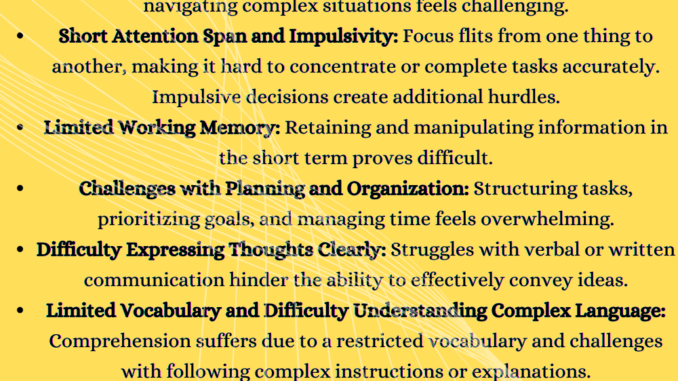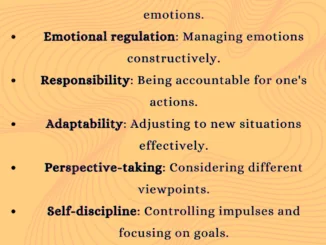
Understanding Signs of Low Intelligence: Learning, Problem-Solving, and Social Skills
Signs of Low Intelligence
Intelligence is a complex and multifaceted trait that encompasses various cognitive abilities, including learning, problem-solving, language skills, and social competence. While intelligence levels can vary widely among individuals, certain signs can indicate low intelligence. Understanding these signs can help in identifying individuals who might need additional support to develop their cognitive and adaptive skills.
Here are some possible signs of low cognitive ability:
- Difficulty learning new things
- Difficulty following instructions
- Frequent misunderstandings
- Problems with reasoning and problem-solving
- Short attention span and impulsiveness
- Lack of curiosity or desire to learn
- Struggles with critical thinking
It’s important to note that these signs can also point to other issues, such as learning disabilities, attention deficit hyperactivity disorder (ADHD), or developmental delays. If you’re concerned about someone’s cognitive abilities, it’s important to consult with a healthcare professional for a proper diagnosis.
Here are some things that aren’t necessarily signs of low intelligence:
- Not being good at math or science: Intelligence comes in many forms. Someone who struggles with math may be a gifted writer or musician.
- Having learning difficulties: There are many reasons why someone might have difficulty learning, and it doesn’t necessarily mean they’re not intelligent.
- Having a slow processing speed: Some people just take longer to process information than others. This doesn’t mean they’re not intelligent.
- Having a different learning style: Everyone learns differently. Some people learn best by listening, while others learn best by doing.
If you’re looking to improve your cognitive abilities, there are a number of things you can do. These include:
- Regular exercise: Exercise has been shown to improve cognitive function.
- Getting enough sleep: Sleep is essential for brain health.
- Eating a healthy diet: A healthy diet can help to improve cognitive function.
- Learning new things: Challenge yourself by learning new skills or hobbies.
- Playing brain games: Brain games can help to improve cognitive function.
Remember, intelligence is just one aspect of a person. Everyone has their own strengths and weaknesses.
Read Also:
Understanding Signs of Low Intelligence: Learning, Problem-Solving, and Social Skills
1. Difficulties with Learning and Memory
One of the primary signs of low intelligence is a noticeable difficulty with learning and memory. Individuals may struggle to grasp new concepts, retain information, and recall previously learned material. This can manifest in various ways, such as:
- Slow Learning Pace: Taking longer to understand and master new skills compared to peers.
- Frequent Forgetfulness: Difficulty remembering instructions, facts, or details, even after repeated exposure.
- Repetition Requirement: Needing frequent repetition and practice to retain information.
- Poor Academic Performance: Consistently low grades and difficulty keeping up with the academic demands in school.
These challenges can stem from underlying cognitive deficits that affect the ability to process and store information efficiently.
2. Challenges in Problem-Solving and Critical Thinking
Low intelligence is often characterized by significant challenges in problem-solving and critical thinking. These individuals might:
- Struggle with Abstract Thinking: Difficulty understanding concepts that are not concrete or directly observable.
- Poor Judgment: Making decisions that are impractical or lacking in foresight.
- Difficulty with Complex Tasks: Finding it hard to break down and solve problems that require multiple steps or higher-order thinking.
- Limited Strategic Thinking: Inability to develop and implement effective strategies to achieve goals or solve problems.
These difficulties can lead to a reliance on simple, concrete thinking and an inability to deal with novel or complex situations effectively.
3. Limited Language and Communication Skills
Effective communication is a key component of intelligence. Individuals with low intelligence often exhibit limited language and communication skills, which can include:
- Reduced Vocabulary: Having a smaller lexicon and struggling to learn new words.
- Simple Sentence Structure: Using basic and grammatically incorrect sentences.
- Difficulty Understanding Nuance: Struggling to comprehend and use figurative language, idioms, or complex instructions.
- Problems with Expression: Difficulty conveying thoughts and ideas clearly and coherently.
These limitations can impede social interactions and academic performance, making it challenging to engage in meaningful conversations and understand complex material.
4. Poor Social and Emotional Competence
Social and emotional intelligence are critical aspects of overall cognitive functioning. Individuals with low intelligence may show:
- Inappropriate Social Behavior: Difficulty understanding social norms and cues, leading to awkward or inappropriate interactions.
- Limited Empathy: Struggling to recognize and respond to the emotions of others.
- Emotional Regulation Issues: Difficulty managing their own emotions, which can result in outbursts or inappropriate reactions.
- Weak Relationship Skills: Challenges in forming and maintaining healthy relationships due to poor communication and social understanding.
These social and emotional difficulties can lead to isolation, misunderstandings, and conflicts in personal and professional relationships.
5. Struggles with Adaptability and Flexibility in Thinking
Adaptability and mental flexibility are essential for coping with change and solving problems. Signs of low intelligence in this area include:
- Rigidity in Thinking: Difficulty adapting to new situations or changing perspectives.
- Resistance to Change: Preferring familiar routines and showing resistance to new experiences or methods.
- Inflexible Problem-Solving: Sticking to the same approach even when it is ineffective, rather than trying new strategies.
- Difficulty with Abstract Concepts: Struggling to understand and apply concepts that are not directly related to their immediate experience.
These challenges can hinder an individual’s ability to cope with life’s uncertainties and adapt to new circumstances, affecting both personal growth and professional success.
Conclusion
While these signs can indicate low intelligence, it’s important to approach the topic with sensitivity and understanding. Intelligence is a multifaceted trait influenced by various factors, including genetics, environment, and education. Recognizing these signs can help in providing the necessary support and interventions to improve cognitive and adaptive skills, fostering better outcomes for individuals facing these challenges.
Intelligence is a Spectrum, Not a Score:
Traditional metrics like standardized tests only capture a sliver of a person’s brilliance. Someone who struggles with math equations might compose soul-stirring symphonies. Focusing on an individual’s strengths and fostering a nurturing environment is key to unlocking their full potential.
The Takeaway: Fostering Support, Not Stigma
Approaching this topic with sensitivity is paramount. Recognizing signs of potential delays is not about labeling someone, but rather about creating a roadmap to provide the necessary scaffolding. Early intervention and tailored support systems can significantly enhance cognitive and adaptive skills, empowering individuals to thrive.
Let’s move beyond stereotypes and cultivate a space of understanding. By recognizing the multifaceted nature of intelligence and providing the right support, we can empower individuals to reach their full potential.



2 Trackbacks / Pingbacks
Comments are closed.